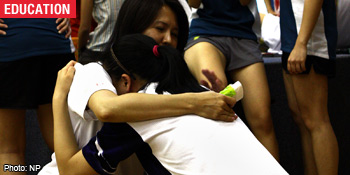- Joined
- Aug 8, 2008
- Messages
- 3,619
- Points
- 48
http://www.asiaone.com/News/Education/Story/A1Story20090530-144955.html
Mon, Jun 01, 2009
The New Paper

Why focus on where players come from?
I READ the report, 'Badminton finals between junior colleges turn into 'S'pore v China' (The New Paper, 27 May) with concern and dismay.
The representatives from Jurong Junior College (JJC) comprise students from China, Korea and Singapore.
It was encouraging to see students, despite their different nationalities, displaying impressive teamwork and unity to represent their school in a sporting event.
It bears testimony to JJC's commendable success in fostering integration between local and international students and in involving the foreign students in school activities. What is also heartening is the throngs of JJC supporters, both international and local students, who turned up to cheer their team and, in good sportsmanship, applaud the winning team.
However, instead of recognising the college's effort in fostering a more cosmopolitan environment and to offer its local students an international experience, the report has chosen to focus on the perceived unfairness in fielding 'foreign students', never mind the fact that these students are pursuing their studies in the college.
It appears that the report, from an arguably parochial perspective, has done an injustice and undermined the conscientious effort made by the Ministry of Education and many schools to integrate the international students in our school community and to imbibe in them a sense of belonging.
This is, after all, the National Inter-School Championship. Let the best school win, and let us leave the students' country of origin out of it.
This article was first published in The New Paper.
Mon, Jun 01, 2009
The New Paper

Why focus on where players come from?
I READ the report, 'Badminton finals between junior colleges turn into 'S'pore v China' (The New Paper, 27 May) with concern and dismay.
The representatives from Jurong Junior College (JJC) comprise students from China, Korea and Singapore.
It was encouraging to see students, despite their different nationalities, displaying impressive teamwork and unity to represent their school in a sporting event.
It bears testimony to JJC's commendable success in fostering integration between local and international students and in involving the foreign students in school activities. What is also heartening is the throngs of JJC supporters, both international and local students, who turned up to cheer their team and, in good sportsmanship, applaud the winning team.
However, instead of recognising the college's effort in fostering a more cosmopolitan environment and to offer its local students an international experience, the report has chosen to focus on the perceived unfairness in fielding 'foreign students', never mind the fact that these students are pursuing their studies in the college.
It appears that the report, from an arguably parochial perspective, has done an injustice and undermined the conscientious effort made by the Ministry of Education and many schools to integrate the international students in our school community and to imbibe in them a sense of belonging.
This is, after all, the National Inter-School Championship. Let the best school win, and let us leave the students' country of origin out of it.
This article was first published in The New Paper.
